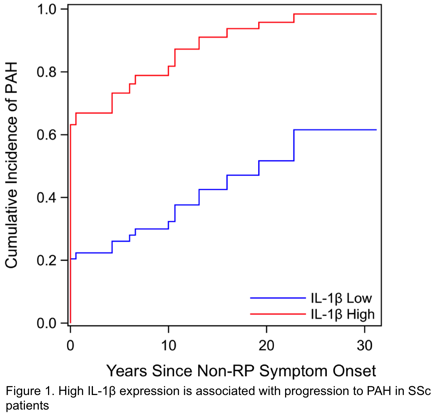Session Information
Date: Sunday, November 5, 2017
Session Type: ACR Poster Session A
Session Time: 9:00AM-11:00AM
Background/Purpose: Systemic sclerosis (SSc) is an autoimmune disease characterized by vascular abnormalities, immune system dysregulation, and fibrosis. Pulmonary arterial hypertension (PAH) affects approximately 10% of SSc patients and is a leading cause of death. We sought to identify cytokines predictive of progression to PAH in SSc.
Methods: Pulmonary Hypertension Assessment and Recognition of Outcomes in Scleroderma (PHAROS) is a prospective registry that includes SSc patients at high risk for PAH based on pulmonary function test and echocardiographic parameters. Serum was available from 38 high-risk patients for this study. Baseline characteristics were assessed at the time of serum acquisition. Kaplan-Meier estimates were generated for time to PAH from first non-RaynaudÕs Phenomenon (RP) symptom. The Luminex (eBioscience) immunoassay (Human 62-plex) was used for serum cytokine profiling. Missing data were multiply imputed to generate 60 complete datasets. Using multivariable Cox regression, time to PAH was regressed on a candidate predictor set consisting of all cytokines’ preprocessed median fluorescence intensities and four clinical covariates which had previously been shown to be associated with progression to PAH in the PHAROS cohort (exercise induced O2 saturation, % predicted diffusing capacity for carbon monoxide (DLCO), forced vital capacity/DLCO, systolic pulmonary artery pressure on echocardiogram) (1). Regression coefficients were estimated by five-fold cross-validated, likelihood-based boosting.
Results: Baseline characteristics are shown in Table 1. At 1, 5,10, 15, and 20 years after first non-RP symptoms, the rate of progression to PAH in this high-risk population was 3%, 5%, 15%, 18%, and 31% respectively. Elevated levels of IL-1Beta (Figure 1) and IL-15 (not shown) correlated with an increased risk of progression to PAH.
Conclusion: These preliminary results identified IL-1Beta and IL-15 as potential biomarkers associated with progression to PAH in SSc. These may be useful in identifying high-risk patients who warrant early referral to right heart catheterization, and may provide further insight into the mechanism of disease. We plan to validate our findings in an independent cohort.
1) Hsu et al. Development of pulmonary hypertension in a high-risk population with systemic sclerosis in the Pulmonary Hypertension Assessment and Recognition of Outcomes in Scleroderma (PHAROS) cohort study. Semin Arthritis Rheum. 2014;44(1):55-62.
To cite this abstract in AMA style:
Kolstad KD, Holmes T, Rosenberg-Hasson Y, Sweatt A, Zamanian RT, Li S, Steen VD, Utz PJ, Chung L. Identification of Biomarkers Predictive of Pulmonary Arterial Hypertension in Systemic Sclerosis [abstract]. Arthritis Rheumatol. 2017; 69 (suppl 10). https://acrabstracts.org/abstract/identification-of-biomarkers-predictive-of-pulmonary-arterial-hypertension-in-systemic-sclerosis/. Accessed .« Back to 2017 ACR/ARHP Annual Meeting
ACR Meeting Abstracts - https://acrabstracts.org/abstract/identification-of-biomarkers-predictive-of-pulmonary-arterial-hypertension-in-systemic-sclerosis/


